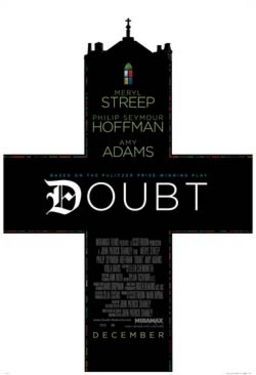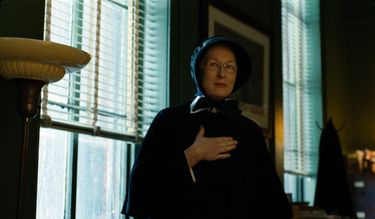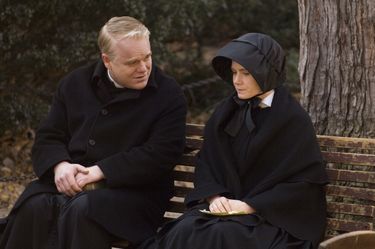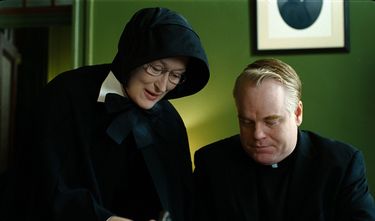Doubt

 In bringing his Pulitzer Prize and Tony Award winning play to the screen, Shanley has not only held onto its undeniable energy and quietly engrossing storytelling, but has assembled the finest cast I could think of to tell the story. Meryl Streep is Sister Aloysius Beauvier, an old-fashioned battle ax of a nun who serves as the Principal of The Saint Nichols Church School, and always manages to place fear in the hearts of her students and even some of her staff. She is determined, and set in her ways. When someone suggests they use "Frosty the Snowman" for an upcoming Christmas concert the students are giving, she is against it, thinking the song promotes Satanism with its talk of magical hats bringing snowmen to life. Philip Seymour Hoffman is Father Brendan Flynn, a priest who represents a new more open-minded look at religion, and is quickly gaining popularity with both the staff and the students. There is obvious tension between the two, and both are set in their ways. Caught in the middle is Sister James (Amy Adams), an idealistic and optimistic new teacher at the school who sets the main conflict into motion when one of her students, Donald Muller (Joseph Foster II), is called to see the Father, and returns to class deeply troubled and with the smell of alcohol on his breath.
In bringing his Pulitzer Prize and Tony Award winning play to the screen, Shanley has not only held onto its undeniable energy and quietly engrossing storytelling, but has assembled the finest cast I could think of to tell the story. Meryl Streep is Sister Aloysius Beauvier, an old-fashioned battle ax of a nun who serves as the Principal of The Saint Nichols Church School, and always manages to place fear in the hearts of her students and even some of her staff. She is determined, and set in her ways. When someone suggests they use "Frosty the Snowman" for an upcoming Christmas concert the students are giving, she is against it, thinking the song promotes Satanism with its talk of magical hats bringing snowmen to life. Philip Seymour Hoffman is Father Brendan Flynn, a priest who represents a new more open-minded look at religion, and is quickly gaining popularity with both the staff and the students. There is obvious tension between the two, and both are set in their ways. Caught in the middle is Sister James (Amy Adams), an idealistic and optimistic new teacher at the school who sets the main conflict into motion when one of her students, Donald Muller (Joseph Foster II), is called to see the Father, and returns to class deeply troubled and with the smell of alcohol on his breath.The answer is not so simple, as the title suggests. Father Flynn has an answer for every question that Aloysius has when she learns of the encounter from Sister James. He even has an answer for the alcohol. There was, in fact, much to doubt in 1964, which is when the story is set. The assassination of President Kennedy was still fresh in the world's mind, and young Donald is the school's first black student, as integration took its first steps. This alone throws Aloysius' accusations of Father Flynn into a harsh light. Could it be that she is merely using this as an excuse to get rid of a man she has publically been at odds with? After all, there is no real evidence that any wrongs took place. The battle lines between the two are drawn, as Aloysius will not back down in her belief that Flynn is guilty and hiding something. Sister James is forced to pick sides, and in a way, she represents us the audience. Just like her, we are not given all the details, only bits of pieces of what we see and hear that throw both sides of the argument. Just like her character, we are forced to pick sides, and no easy or even straight-forward answers are given. We ourselves are thrown into doubt as the story unfolds.
 Since Doubt is mainly set in and around the school itself, it is up to the performances and the characters to grab our attention. The moment each of the main cast sets foot on the screen, we can scarcely take our eyes off of them. Putting two of the biggest acting talents, Meryl Streep and Philip Seymour Hoffman, in the same movie can only raise our expectations, and they are fortunately able to meet our demanding hopes. Streep completely disappears into the role of the steely and determined Sister Aloysius, being forceful and narrow-minded, but still human. Her character is not two dimensional, as her final scene shows. We get the sense that she's held onto her beliefs because they are all she has left. Whenever doubt settles in, she battles it with determination, wether she is right in her thinking or not. As her rival, Hoffman is charismatic and sympathetic, but able to cast just enough shadow upon his character to make us question him. He finds the right balance of light and shadow in his character, and never lets one aspect overpower the other.
Since Doubt is mainly set in and around the school itself, it is up to the performances and the characters to grab our attention. The moment each of the main cast sets foot on the screen, we can scarcely take our eyes off of them. Putting two of the biggest acting talents, Meryl Streep and Philip Seymour Hoffman, in the same movie can only raise our expectations, and they are fortunately able to meet our demanding hopes. Streep completely disappears into the role of the steely and determined Sister Aloysius, being forceful and narrow-minded, but still human. Her character is not two dimensional, as her final scene shows. We get the sense that she's held onto her beliefs because they are all she has left. Whenever doubt settles in, she battles it with determination, wether she is right in her thinking or not. As her rival, Hoffman is charismatic and sympathetic, but able to cast just enough shadow upon his character to make us question him. He finds the right balance of light and shadow in his character, and never lets one aspect overpower the other.The supporting roles may not get as much screen time, but they are no less memorable. Amy Adams delivers yet another strong performance as the torn Sister James, who finds her thoughts swaying between faithfulness to her fellow Sister, to the Father, and to problems at home. As mentioned earlier, her character is the most accessible, as we share many of the same feelings as her during the course of the story. Adams is able to bring enough warmth and uncertainty to her role to make her easy for us to relate to. Special mention must also be given to Viola Davis, who plays the mother of the young boy at the center of the drama. She only has one extended scene with Streep in the entire film, but it is one of the most powerful moments in the film, and in recent memory. She is wrenching and absorbing in the limited time she is on camera, and a supporting Oscar nomination would most certainly be welcome.

See the movie times in your area or buy the DVD at Amazon.com!






0 Comments:
Post a Comment
<< Home